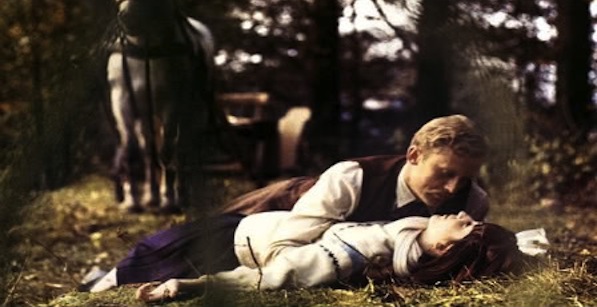By turns elegiac and winsome, Andrzej Wajda’s Young Girls of Wilko (1979) may be his most balanced and sustained work, though at the time of its release it felt like a departure of sorts.
Fresh from directing a series of politically charged, stylistically diverse movies, like the epic Land of Promise (1975), the angry Man of Marble (1977) and the harsh Without Anesthesia (1978), Wajda’s sudden plunge into the serene was both surprising and refreshing. Wajda – a trained painter – made a trademark of giving his movies a rich look. Cinematographer Edward Kłosiński worked closely with the art director Allan Starski (two decades from his achievements in Schindler’s List [1993]) to created a gauze-veiled vision of Wilko, a wealthy country estate in pre-Communist Poland. Through their eyes, Wilko is seen in diffused light and soothing tones. Sharp edges are broken down, and every visible light source glows as if dipped in honey:
The “story” is all in the past – what we see in the movie is a gentle excavation of some old, never-fulfilled passions of yesteryear. In 1929, Wiktor Ruben (Daniel Olbrychski) follows his doctor’s advice and takes retreat in the Wilko manor house, where he used to spend summers back in his twenties. In Wilko, he meets the eponymous “young girls”, most of whom had married in the meantime: Julcia (Anna Seniuk), Jola (Maja Komorowska), Kazia (Krystyna Zachwatowicz; Wajda’s real-life spouse), Zosia (Stanisława Celińska) and the youngest Tunia (Christine Pascal). The group then spends time reigniting feelings long lost or forgotten.
The “young girl” he loved the most, Fela, died years before, thus contributing to the pervading presence of death in Wiktor’s life. Wiktor is a survivor of both World War I and the Polish war against the Bolshevik invasion of 1919-21 (the latter figuring in the movie only by vague allusions to “the time at Kiev”). The film starts with Wiktor attending the burial of a friend in the opening sequence. In fact, Wiktor feels it’s too late for him to start living anew. His willed seclusion from the world seems final (“You were always different; it’s no merit, just a fact of life”, Kazia says to him).
Wiktor is not unlike many male characters in Henry James, who often prefer detached spectatorship of other people’s lives to – as James would have put it – the real thing. Wiktor’s otherness and inability to engage in a lasting relationship with anyone mirrors the seclusion of Jarosław Iwaszkiewicz, the author of the novella the movie is based on (though married, he was a homosexual at the time and in a country immune to gay emancipation). In the female-reigned Wilko (the mere name of which is menacing in Polish, since it derivates from the noun for “wolf”), it’s Wiktor who becomes the desired object. He’s objectified by female gazes many times in the course in the film, and jealous Tunia even takes an aim at him from her rifle.


What Wiktor steadily realizes during his repeated visits in Wilko, is his ultimate irrelevance to the paths each of the womens’ lives had followed. His brief sexual encounter with Jola toward the end of the movie proves to be her victory: the morning after, over a joyous breakfast shared by Jola and Julcia, Wiktor literally fades away from their scope. They talk past him. His sudden revelation (“To tell you the truth, Julcia was the one I’ve always loved!”) gets barely noticed with a mix of embarrassment and impatience. Wiktor is no longer in charge of anything; his constant stalling ruled him out of the game.
Iwaszkiewicz’s story ended on a note of firm hope for some positive (if not vital) change having occurred in Wiktor, finally able to recognize his limitations and no longer haunted by the past. Per its narrator, “by the time he entered the station, he was swinging his briefcase cheerfully (…)” . The movie cancels this hope, and replaces it with a stunning coda: the old man making eye-contact with Wiktor on the departing train is Jarosław Iwaszkiewicz, the author of the source novella himself. It was him lighting candles for the dead in the opening sequence; it was him who strolled past Wiktor later on. And now it’s him who takes a quiet, mildly amused look at his own troubled creation.



It’s Iwaszkiewicz’s presence, not Wiktor’s ability to change, that redeems him in Wajda’s film. We cannot be sure how much Wiktor learned or understood, but we at least know his plight was borne out of a real life, filled with real struggle and true sense of beauty. In a way, it’s as much a movie about Jarosław Iwaszkiewicz’s imagination as it is an adaptation of his prose. As the final, hand-written title dedicates the movie to Iwaszkiewicz, we get a firm sense of at least one life finding fulfillment. As for Wiktor, his fate is still not sealed.
Michał Oleszczyk is a contributor to “Kino”, the Polish film monthly and author of the first Polish monograph of Terence Davies (“Bitter Exile”, Kraków 2008).







